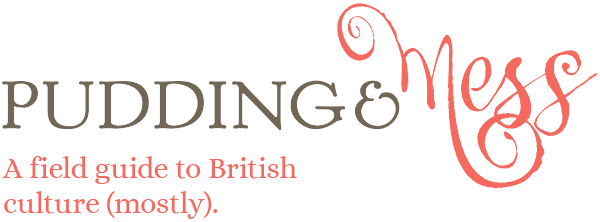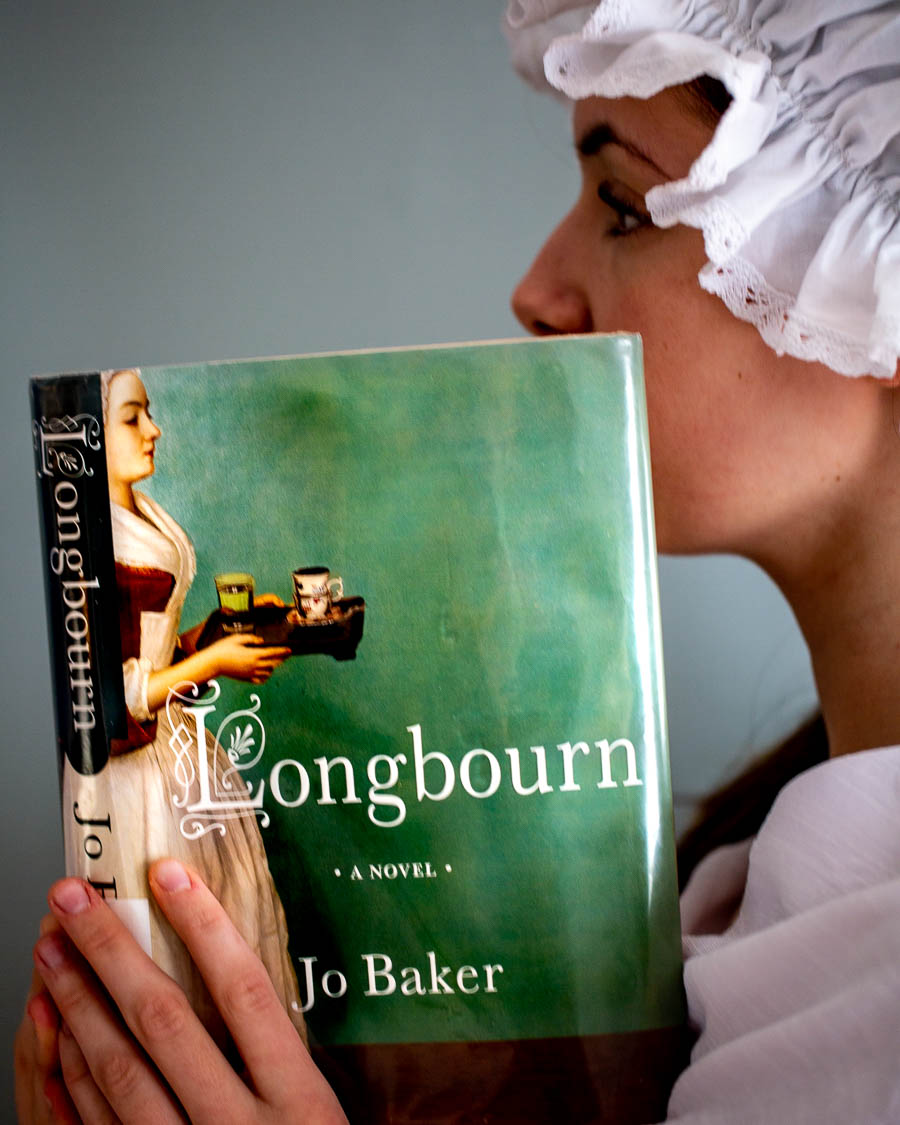~Longbourn Jo Baker Named after the house in which the Bennet family lived, this is a sobering portrayal of what must take place behind the scenes in order to make the household of a respectable family run smoothly. A world where something as simple as an afternoon walk in spring upstairs, requires an afternoon of cleaning muddy boots downstairs. And how an evening excursion to a ball creates all manner of excitement and giddiness for the young ladies attending, but also creates a mountain of laundry and sewing and patience for their servants who must make it all happen – not to mention the burns and blisters from the tongs used to achieve those exquisite curls. The story revolves around several servants whose days are spent emptying chamber pots, washing petticoats and scrubbing floors while the familiar story of Pride and Prejudice runs quietly in the background. But when a mysterious new footman shows up one day, they get to indulge in a little drama and romance all their own. An imaginative re-telling of a classic read, turned inside out and upside down, with the prevailing theme being that those residing downstairs, live their lives entirely at the whim of those residing upstairs.
~The Jane Austen Society Natalie Jenner WWII has not long since ended and its shadow of grief still lingers in the small English village of Chawton where Jane Austen lived out her final days in a house on her brother’s estate. When Jane’s home and legacy come under threat, a disparate group of people unite to save it all. The local doctor, a young widow, a farmer, a maid, and a Hollywood movie star, despite their very different lives, and lost souls all, are drawn together by their mutual love of Jane’s writing and its ability to offer up hope and refuge. It’s a charming story and written nicely enough, but it didn’t quite fire on all cylinders for me, lacking some in depth and spark.
~Miss Austen Gill Hornby One of the pleasures of reading classical literature is the tranquility of it. Without the buzz of mod cons and the chatter of technology, life quiets down just a little. And so it is with this novel. The Miss Austen of the title is not Jane herself, but Cassandra, the sister with whom she shared a deep intimacy. It’s a well known fact that years after Jane’s death, and not too long before her own, Cassandra burned most of her sister’s letters in an attempt to preserve Jane’s reputation and, in the process, deprived the literary world of so, so much. The more cynical amongst us must surely wonder what skeletons were hidden in Jane’s closet — an illicit meeting or stolen kiss perhaps. Alas, we will never know. This book gives a fictional account of how Cassy, in her 60’s, returns to the home of old family friends in order to hunt down Jane’s letters and upon finding them, revisits her own past, examining the role of women in society along the way, with all the observation and wit of her sister. Relaxing, entertaining and thoroughly enjoyable.
~The Other Bennet Sister Janice Hadlow In Pride and Prejudice Mary is the plain and preachy middle sister who possesses neither “genius nor taste”. But what if Mary isn’t plain, but just plain misunderstood. This book puts Mary at the center of the Pride and Prejudice, enduring cruel words from her mother and the slights of her sisters and father. The first third is a retelling of the story told from Mary’s perspective, but then there’s a two year jump and the book is much better for it. When their father dies unexpectedly, all the sisters are married and settled, except for Mary. Along with her mother she is left in uncertain limbo, no longer able to live at Longbourn due to the law of primogeniture which states that women cannot inherit property — you may recall that Mr. Collins, the minister, inherits the house. We see Mary bouncing from house to house for a while until she moves to London to live with the Gardiner family. The Gardiners not only adore Mary, but finally give her a sense of belonging and the courage to be herself. Here, Mary comes into her own as she navigates London society with the odious Miss Bingley nipping at her heels. A clever concept, solidly written and Hadlow is successful in building an immersive world, but, once again, I found it lacked that wit and complexity of Austen’s work that I always find myself hoping for in these books. Very much a me problem I think! The book did feel ploddy at times, most likely explained by the fact that at a whopping 480 pages, it could have easily been 150 pages shorter.
~Death Comes To Pemberly P.D.James Several years after the events of Pride and Prejudice have drawn to a conclusion, Elizabeth Darcy is in the midst of preparations for her annual autumn ball when Lydia Wickham tumbles through the front door of Pemberly screaming that her husband is dead. Darcy immediately organizes a search of the nearby woods where he finds Wickham drunk and bloodstained but very much alive. Unfortunately, he also finds the corpse of Wickham’s best friend, Captain Denny lying beside him. Wickham is arrested. But – did he really commit this murder? A caddish seducer of young ladies he may be, but a killer? I came to this book expecting the authors usual calibre of smart, nuanced writing. Surely, P.D. James would make Elizabeth Darcy a perceptive and sparkly detective, replete with a delicate, wry humor and subtle edginess. Unfortunately, it appears that the passage of time, two children and taking care of an enormous stately home have taken their toll on our favorite feisty heroine. She has become unbelievably dull. In fact it pains me to have to say that this book -in plot, in dialogue, in characters – is shockingly lackluster . How such an excellent writer failed to capture, not just the essence of Austen, but her characters as well, is anybody’s guess. Skip it I say (although other reviews have been glowing so blithely ignore my opinion, perhaps) and watch the TV miniseries instead. It may not be the best of Austen-esque shows but it will require less time, has a great cast and will at least offer up the visual treats of Regency England and the stunning setting of the English countryside.
~First Impressions Charlie Lovett Sophie Collingswood has become a lover of books thanks to her Uncle Bertram. When he dies suddenly he leaves her his London home — bereft of its books which were sold to pay off debts. Sophie takes a job at an antiquarian bookshop and sets out to solve two mysteries: how did her beloved Uncle really die and why are two different customers looking for the same rare copy of a second edition book by Richard Mansfield. Sophie is slowly drawn into a mystery which casts doubt as to the true authorship of Pride and Prejudice — oh, the shock and horror. Surely the world would tilt off its axis if it were discovered that Jane Austen merely plagiarized her book. In order to arrive at the truth, past and present are interwoven into a story that, well, relies just a little too heavily on coincidence and while it starts out strong, somewhere along the way it disintegrates into silliness with a denouement which is just a teensy weensy bit over the top. But, you know what, I kind of enjoyed it despite all of that.
~The Jane Austen Project Kathleen A. Flynn Set in the future in a world where Earth’s atmosphere has been destroyed and natural light no longer exists, it is also a world that has discovered how to time travel and still has a deep fascination and love of Jane Austen. Thus, Doctor Rachel Katzman and actor Liam Finucane must travel to 1815 and save a Jane Austen manuscript from destruction. Before they leave, the two go through intense training to fit into the 1800’s which still manages to leave them wholly unprepared for the dilemmas and inconveniences of 19th century England. As Rachel and Liam become entwined in the lives of Jane and Henry Austen, it becomes increasingly difficult for them to fulfill their mission while leaving history intact. There are a lot of things that could have gone wrong in this book, and, surprisingly, didn’t. The Regency details felt authentic and the conundrums of time travel were interesting and amusing. I could have done without a romance that develops but overall I was pleasantly surprised by this book. It may not be literature but it was certainly entertaining.
~Jane Austen series Stephanie Barron I think, at this point, it is safe to say that trying to re-create the world of Jane Austen is fraught with disappointment, so it makes me happy to turn to this series of books, which, of all the ones I’ve read, come closest to achieving her style and wit (and written by an American, no less, go figure). It is, of all things, a mystery series in which Jane Austen has turned sleuth. Actual facts from Jane’s life and historical events are woven together with fictional murder mysteries in a seamless blend of fact and fiction. The Regency details are spot on and the tone of the language throughout feels authentic with Barron closely following the course of Jane’s life, using details found in her personal correspondence and incorporating them into the books — the writing of novels, family relationships and deaths are all there. The humour, as would be expected, is dry and witty. And the good news is, that if you fall in love with them, there are 15 altogether. I do have to confess to being a wee bit disappointed that Barron didn’t choose to create an alternate timeline for Jane, one in which she didn’t die so tragically early at 41, depriving us of so many literary heroines.

